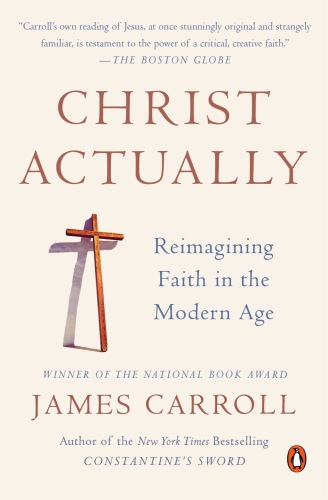
Christ Actually
The Son of God for the Secular Age
کتاب های مرتبط
- اطلاعات
- نقد و بررسی
- دیدگاه کاربران
نقد و بررسی

September 1, 2014
With well-researched clarity, Carroll explores the question posed by anti-Nazi Lutheran pastor and martyr Dietrich Bonhoeffer: who actually is Christ for us today? A former Catholic priest, Carroll (Constantine's Sword) is Christ-haunted, as Flannery O'Connor once said of the South, and he is Holocaust-haunted. For Carroll, the Holocaust is not so much a question of evil as a question of history: Christianity has defined itself as an evolution beyond Judaism, and that has justified centuries of anti-Semitism that culminated in the Holocaust. Contemporary biblical studies scholarship that understands Jesus as a Jew addresses the historically troubled question of Christian-Jewish relations, still a tender point. So who can Jesusâthe distinctive figure of Christianityâbe for today's secular age? Carroll nicely translates contemporary scholarship about Jesus that emphasizes his quintessential Judaism, something scholars in today's academy often stint. The author's understanding of a mass atrocity that shakes faith is unfortunately limited to a 20th-century Euro-American frame of reference, despite lamentable occurrences of genocide against other groups at other times in history. Because Christ actually is meaningful in some way to a billion Christians around the globe, this heartfelt investigation is of interest to many. Agent: Tina Bennett, William Morris Endeavor.

October 15, 2014
To understand Jesus today, writes novelist and religion expert Carroll (Warburg in Rome, 2014, etc.), he must first be understood as a Jew.The author takes as his muse Dietrich Bonhoeffer's World War II-era statement: "What is bothering me incessantly is the question-Who Christ actually is for us today?" Looking at Jesus through the lenses of the Holocaust and the atomic bomb, Carroll discerns a different image than much of Christian history has before. Above all else, he asserts, Christ must be seen as and understood as a Jew. Though a seemingly obvious statement, the author explains at length how Christians have failed to recognize Christ's Jewishness through time-or at least not taken it seriously. Exploring the Gospels as storytelling, not as history, Carroll describes a man who was seen by many as the fulfillment of Jewish hopes in his own time, while he was recorded as breaking with Jewish intransigence in later Scripture. The author explains that the Jesus Christ of Christendom was remembered in the wake of two grand disappointments: the lack of his immediate return and the destruction of the Temple. Given this, his followers adapted, seeing him as the embodiment of a new temple and his church as the kingdom of God on Earth. As usual, Carroll's writing is highly erudite; reading him is an educational experience in itself. Traditionalists will balk at his acceptance of some modernist theories, however. For instance, he finds it plausible that Jesus was a disciple of John the Baptist and goes on to argue that, like other people, Jesus was "defined by...the moral lapses that would have made real the need for repentance that brought him to John." Even the author's conclusion that "we are here less to believe in Jesus than to imitate him" will raise some eyebrows. An in-depth, thought-provoking challenge to two millennia of Christian interpretation.
COPYRIGHT(2014) Kirkus Reviews, ALL RIGHTS RESERVED.

November 1, 2014
Former priest, Catholic reformer, and Boston Globe columnist Carroll (distinguished scholar in residence, Suffolk Univ.; Constantine's Sword) here sets out to answer theologian Dietrich Bonhoeffer's question from a Nazi cell: Who is Christ actually for us today? That is, what can one honestly believe about Jesus Christ after the Holocaust? Carroll's thoughtful and deeply personal quest takes him back to an earlier catastrophe, the Roman war against the Jews (66-136 CE), the context in which the Gospels were written, and the birthplace of two millennia of Christian anti-Semitism. The bulk of the book is spent unpacking the implications of this context for Christian understandings of Jesus, revealing the Jewishness of both the historical Jesus and the Christ of faith, in contrast with later interpretations which set him against his own people. Carroll takes a fresh look at biblical figures such as John the Baptist, Paul, Peter, and Mary Magdalene, and their connections with Jesus in light of the Roman war's impact on the Christian scriptures. The end result is a beautiful portrait of Christ and faith in a post-Auschwitz world. VERDICT Highly recommended for readers interested in biblical studies, theology, and critically informed yet devout expressions of the Christian faith. [See Prepub Alert, 6/2/14.]--Brian Sullivan, Alfred Univ. Lib., NY
Copyright 2014 Library Journal, LLC Used with permission.

October 1, 2014
The New Testament proclaims Jesus Christ the same yesterday, and today, and forever. But Carroll rejects the possibility of a timeless faith as he strives to reconceive Christ for a secular, post-Holocaust, post-Hiroshima era. The Jesus that people need today, he avers, is a not a miracle-working Redeemer but rather a son of God realizing a fully human life here and now as he inspires disciples to altruism, in the manner of Schweitzer and Tolstoy. This postmodern Jesus does not open heaven by atoning for human sins, but he does lift society by showing the way to equitable social relationships. While paring away Christ's supernatural attributes, Carroll insistently restores Jesus' Jewishness, a Jewishness long obscuredin Carroll's opinionby gospels whose authors interpreted the Romans' brutal destruction of Jerusalem as a divine judgment on the people who crucified Christ. As a Catholic who abandoned the priesthood to escape the confines of orthodoxy, Carroll offers little to conservative Christians. But readers seeking a faith responsive to the zeitgeist will find it here.(Reprinted with permission of Booklist, copyright 2014, American Library Association.)

























دیدگاه کاربران